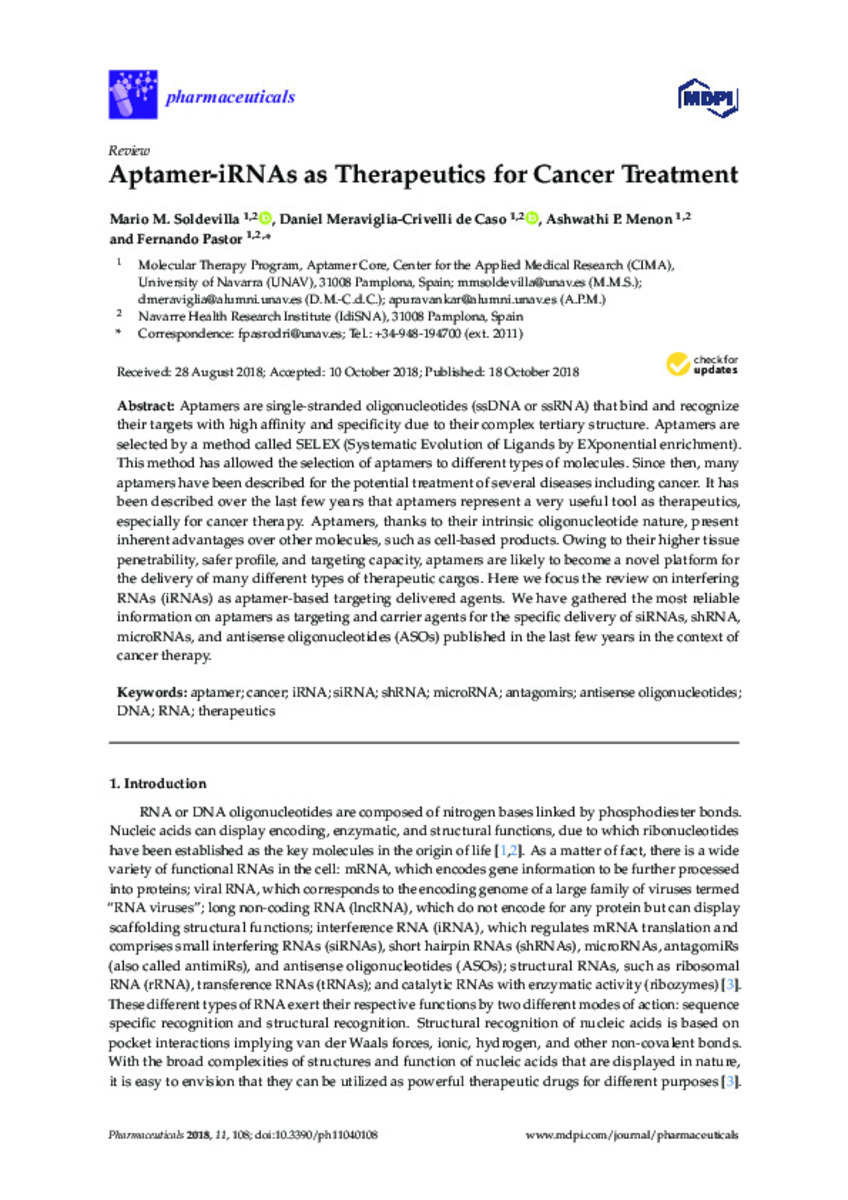Full metadata record
| DC Field | Value | Language |
|---|---|---|
| dc.creator | Martínez-Soldevilla, M. (Mario) | - |
| dc.creator | Meraviglia-Crivelli, D. (Daniel) | - |
| dc.creator | Menon, A.P. (Ashwathi Puravankara) | - |
| dc.creator | Pastor, F. (Fernando) | - |
| dc.date.accessioned | 2023-02-21T13:16:45Z | - |
| dc.date.available | 2023-02-21T13:16:45Z | - |
| dc.date.issued | 2018 | - |
| dc.identifier.citation | Martínez-Soldevilla, M. (Mario); Meraviglia-Crivelli, D. (Daniel); Menon, A.P. (Ashwathi Puravankara); et al. "Aptamer-iRNAs as therapeutics for cancer treatment". Pharmaceuticals. 11 (4), 2018, 108 | es_ES |
| dc.identifier.issn | 1424-8247 | - |
| dc.identifier.uri | https://hdl.handle.net/10171/65527 | - |
| dc.description.abstract | Aptamers are single-stranded oligonucleotides (ssDNA or ssRNA) that bind and recognize their targets with high affinity and specificity due to their complex tertiary structure. Aptamers are selected by a method called SELEX (Systematic Evolution of Ligands by EXponential enrichment). This method has allowed the selection of aptamers to different types of molecules. Since then, many aptamers have been described for the potential treatment of several diseases including cancer. It has been described over the last few years that aptamers represent a very useful tool as therapeutics, especially for cancer therapy. Aptamers, thanks to their intrinsic oligonucleotide nature, present inherent advantages over other molecules, such as cell-based products. Owing to their higher tissue penetrability, safer profile, and targeting capacity, aptamers are likely to become a novel platform for the delivery of many different types of therapeutic cargos. Here we focus the review on interfering RNAs (iRNAs) as aptamer-based targeting delivered agents. We have gathered the most reliable information on aptamers as targeting and carrier agents for the specific delivery of siRNAs, shRNA, microRNAs, and antisense oligonucleotides (ASOs) published in the last few years in the context of cancer therapy. | es_ES |
| dc.description.sponsorship | This work was supported by Worldwide Cancer Research grants 15-1208, Fondo de Investigación Sanitaria-Fondo Europeo de Desarrollo Regional (FEDER) under grant PI17/00372, the Melanoma Research Alliance under grant 509510 and the Fundación Ramón Areces under grant CIVP18A3916. | es_ES |
| dc.language.iso | eng | es_ES |
| dc.publisher | MDPI AG | es_ES |
| dc.relation | info:eu-repo/grantAgreement/MINECO/Proyectos de investigación en salud/PI17/00372/ES/TRANSFORMACION DEL AMBIENTE TUMORAL CON INMUNOCOMPLEJOS APTAMERICOS (IAS): DE LA INMUNOSUPRESION A LA INMUNOESTIMULACION. | es_ES |
| dc.rights | info:eu-repo/semantics/openAccess | es_ES |
| dc.subject | Aptamer | es_ES |
| dc.subject | Cancer | es_ES |
| dc.subject | IRNA | es_ES |
| dc.subject | SiRNA | es_ES |
| dc.subject | ShRNA | es_ES |
| dc.subject | MicroRNA | es_ES |
| dc.subject | Antagomirs | es_ES |
| dc.subject | Antisense oligonucleotides | es_ES |
| dc.subject | DNA | es_ES |
| dc.subject | RNA | es_ES |
| dc.subject | Therapeutics | es_ES |
| dc.title | Aptamer-iRNAs as therapeutics for cancer treatment | es_ES |
| dc.type | info:eu-repo/semantics/article | es_ES |
| dc.description.note | This article is an open access article distributed under the terms and conditions of the Creative Commons Attribution (CC BY) license (http://creativecommons.org/licenses/by/4.0/). | es_ES |
| dc.identifier.doi | 10.3390/ph11040108 | - |
| dadun.citation.number | 4 | es_ES |
| dadun.citation.publicationName | Pharmaceuticals | es_ES |
| dadun.citation.startingPage | 108 | es_ES |
| dadun.citation.volume | 11 | es_ES |
Files in This Item:
Statistics and impact
Items in Dadun are protected by copyright, with all rights reserved, unless otherwise indicated.






